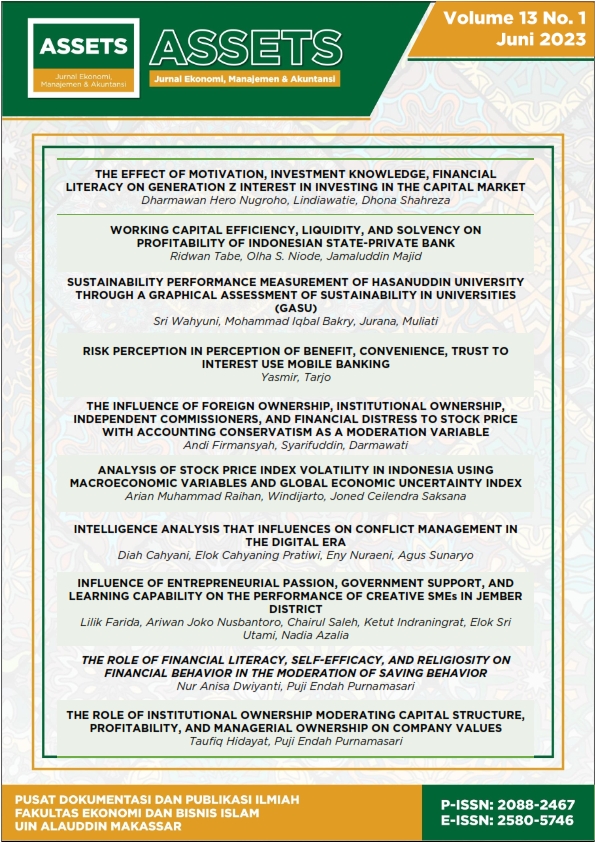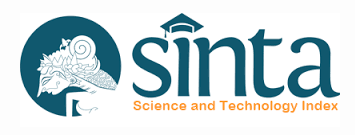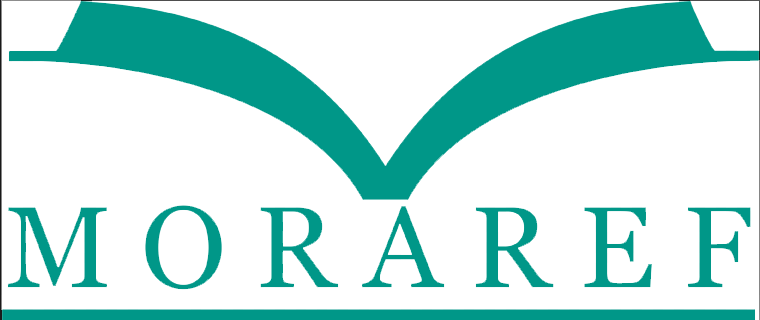THE ROLE OF FINANCIAL LITERACY, SELF-EFFICACY, AND RELIGIOSITY ON FINANCIAL BEHAVIOR IN THE MODERATION OF SAVING BEHAVIOR
Abstrak
The world of finance is growing. It can bring out consumptive behavior from people and irregular financial management, especially among students. The phenomenon of consumptive behavior among students has encouraged researchers to do research that aims to analyze what factors affect financial behavior. Financial literacy, self-efficacy, religiosity, and saving Behavior on Financial Behavior are the variables used. The research method used is quantitive, with data analysis techniques to test hypotheses using SmartPLS. Data collection by distributing questionnaires via a Google form. The sample obtained for this study amounted to 260 respondents. This research shows that financial literacy, self-efficacy, and religiosity significantly influence financial behavior. This study also proves that saving behavior does not have a moderating effect on financial behavior.
Referensi
Abdillah, Willy, and Jogiyanto. 2015.Partial Least Square (PLS) - Alternative Structural Equation Modeling (SEM) in Business Research.
Abdurrahman, Sri Wahyuni, and Serli Oktapiani. 2020. "The Influence of Financial Literacy and the Social Environment on the Financial Behavior of Sumbawa University of Technology Students."Indonesian Journal of Economics and Business 05(02): 50–55.
Ahmad, A. (2019). "The Impact of Locus Of Control, Financial Attitudes, Income, and Religiosity on Financial Behavior."Management & Accounting Expose 2(2): 105–15.
Ajzen, Icek. 1991. “The Theory of Planned Behavior.” Organizational Behavior and Human Decision Processes 50(2): 179–211.
Arofah, Anggarkusuma, and Rani Kurniawati. 2021. "The Influence of Financial Literacy and Self-Efficacy on Financial Behavior."Journal of Economics and Business (PJEB) 1: 1.
Astuti, Citra Fitri, and Purwanto. 2017. "The Influence of Financial Literacy, Financial Attitudes, and Locus of Control on Financial Management Behavior in Pelita Bangsa University Management Students in 2017."Management Study Program, Pelita Bangsa University E-mail: [email protected], [email protected] (1): 1–13.
Atikah, Atik, and Rocky Rinaldi Kurniawan. 2021. "The Influence of Financial Literacy, Locus of Control, and Financial Self-Efficacy on Financial Management Behavior."JMB: Journal of Management and Business 10(2): 284–97.
Defiansih, Defa Defana. 2021. "The Influence of Religiosity, Family Education, and Financial Outreach to Islamic Financial Literacy with Intellectual Intelligence as a Moderating Variable."Journal of Economics and Education 18(1): 34–51.
Fadhila, Fany, Azhar, and Muslim Marpaung. 2020. "The Influence of Religiosity, Product Knowledge and Social Factors on the Use of Shopeepaylater."Halal Economic Business Journal 1(2): 20–30.
Fadilah, Salma Juliana, and Eko Purwanto. 2022. "The Influence of Locus of Control, Financial Literacy Dean Planning on MSME Financial Behavior."Al-Kharaj: Journal of Sharia Economics, Finance & Business 4(5): 1476–88.
Farrell, Lisa, Tim R.L. Fry, and Leonora Risse. 2016. “The Significance of Financial Self-Efficacy in Explaining Women’s Personal Finance Behaviour.” Journal of Economic Psychology 54: 85–99. http://dx.doi.org/10.1016/j.joep.2015.07.001.
Haiyang, Chen, and Ronald P. Volpe. 2019. “An Analysis of Personal Financial Literacy Among College Students.” Journal of Consumer Marketing 36(6): 858–68.
Hidayat, Rais. 2017. "Increasing Interpersonal Communication Activities in Organizations Through Improved Self-Efficacy, Leadership and Team Cohesiveness."Manage: Education Management Journal 4(2): 161.
Islahuddin, and N Syaifudin. 2020. “Indonesia's Largest E-Commerce Market From Millennials.”
Joseph, Chrisela N. 2020. "The Influence of Financial Literacy and Demographic Factors on the Behavior of Personal Financial Management in Ukim Faculty of Economics Lecturers."Soso-Q Journal 8(1): 1–11.
Lown, Jean M. 2011. “2011 Oustanding AFCPE® Conference Paper: Development and Validation of a Financial Self-Efficacy Scale.” Journal of Financial Counseling and Planning 22(2): 54–63.
Marwati, Resti Desi. 2018. "Factors Influencing Saving Behavior of Undergraduate Students at the Faculty of Economics, Yogyakarta State University."Journal of Economic Education: Scientific Studies in the Field of Education and Economics (5): 476–87. https://eprints.uny.ac.id/57719/.
Masita, Asih, Ronny Malavia Mardani, and Eris Dianawati. 2018. "The Influence of Financial Knowledge and Financial Literacy on Financial Management Behavior During the Covid-19 Pandemic."Scientific Journal of Management Research 11(8): 43–52.
Nurhasanah, Muhammad Subianto, and Rika Fitriani. 2012. "Comparison of the Partial Least Square Method (PLS) with Principal Component Regression to Overcome Multicollinearity."Statistics: Theory and Application of Statistics Forum 12(1): 33–42.
Pusparani, Audry, and Astrie Krisnawati. 2019. “Management Partner Journal (JMM Online).” 3(1): 72–83.
Daughter, Erliana Djajayanty. 2022. "The Influence of Personality Attitudes, Religiosity and Lifestyle on Financial Behavior of the Millennial Generation with Financial Distress as a Moderating Variable."
Putri, Mery Henisa, and Ary Satria Pamungkas. 2019. "The Influence of Financial Knowledge, Locus of Control and Financial Self-Efficacy on Financial Behavior."Journal of Managerial and Entrepreneurship 1(4): 926.
Rizkiawati, Nur Laili, and Nadia Asandimitra. 2018. “The Influence of Demography, Financial Knowledge, Financial Attitude, Locus of Control and Financial Self-Efficacy on the Financial Management Behavior of the Surabaya Community.” Journal of Management Science (JIM) 6(3): 2. https://jurnalmahasiswa.unesa.ac.id/index.php/jim/article/view/23846/21793.
Rohmanto, Fajar, and Ari Susanti. 2021. "The Influence of Financial Literacy, Hedonic Lifestyle, and Personal Financial Attitudes on Student Financial Behavior."Ecobisma (Journal of Economics, Business and Management) 8(1): 40–48.
Rosita, Cucuh Anjar, and Muhadjir Anwar. 2022. "Entrepreneurs in the Sepanjang Market Sidoarjo Regency) Financial Literacy on Saving Behavior through Lifestyle (Studies on Female Entrepreneurs in the Sepanjang Market, Sidoarjo Regency) Expenditure Allocation." 3(October): 3327–36.
Poor man. 2017.Basic Quantitative Qualitative Research Methodology and Statistics. Airlangga University Press. https://books.google.co.id/books?id=x0V7DwAAQBAJ.
Siyoto, S, and M A Sodik. 2015. Basic Research Methodology. Literacy Media Publishing. https://books.google.co.id/books?id=QPhFDwAAQBAJ.
Tri Kurniati Khairunnisa, Gatot Nazir Ahmad, and Etty Gurendawati. 2020. "The Influence of Religiosity, Risk Preference, and Locus of Control on Financial Behavior and Their Impact on Personal Financial Distress in Young Workers in DKI Jakarta."JRMSI - Indonesian Science Management Research Journal 11(2): 381–403.
Triani, Atikah, and Rahma Wahdiniwaty. 2020. "The Influence of Financial Knowledge and Financial Attitudes on Financial Management Behavior."Journal of Chemical Information and Modeling 53(1): 1689–99.
Wardani, Ni Putu Ika Sarawati, Embun Suryani, and I Nyoman Nugraha. 2022. "Financial Literacy, Self Efficacy, and Self Esteem on Financial Management Behavior in MSME Actors With Gender as a Moderating Variable."JPIn: Journal of Indonesian Educators 5(2): 129–46. http://jurnal.intancendekia.org/index.php/JPIn/article/view/343.
Wardani, Putri Dyah, and Susanti. 2019. "The Influence of Self-Control, Religiosity, Financial Literacy, Financial Inclusion on Saving Behavior at Islamic Banks of Sunan Ampel State Islamic University Surabaya Students."Journal of Accounting Education 7(2): 189–96.
Yasid, M. 2009. "Saving Behavior of Housewives of Poor Families Participating in the Group-Based Sharia Microfinance Institution Endeavor Program in Bogor, West Java."TAZKIA Islamic Finance & Business Review 4(1): 90–100.
##submission.copyrightStatement##
##submission.license.cc.by-nc-sa4.footer##









